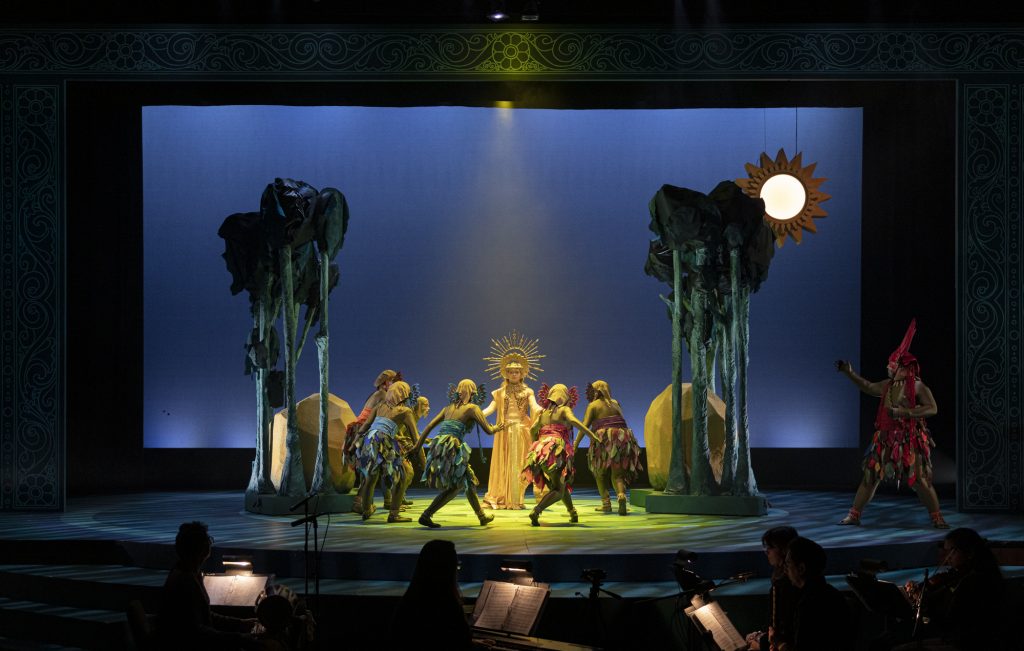Sri Lankan and American theatre came together for Binghamton University’s main stage production of “Bera Handa” from Nov. 16 to 19 in the Watters Theater located in the Anderson Center.
Playwright Bandula Jayawardhana’s “Bera Handa” is a Sri Lankan musical, inspired by Sophocles’ fragmentary play, “Ichneutae.” Translated into English by Sula Mahagam Arachchi, a first-year graduate student in the TRIP program, this production marks the first performance of “Bera Handa” in the English language. The pit orchestra also featured original Sri Lankan drums played by Jithendra Vidyapathy, assistant choreographer and a first-year graduate student studying theatre.
This performance of “Bera Handa” is the brainchild of Lakshmi Damayanthi, adjunct assistant professor of theatre, who has previously starred in another production of “Bera Handa” and directed it with a Sinhalese cast. After proposing “Bera Handa” to the BU theatre department last year, Damayanthi brought the musical to life in an American context with support from all members of the cast and production team.
“What the audience will see is, I will say, a new experience,” Damayanthi said. “A stylistic [theatre] from another part of the world, with all the elements that are different from what they see in an American setting […] Lighting and choreographing, the drum sounds, music patterns — everything is different costumes. It’s like a whole new world opening for somebody who is not familiar with South Asian or Sri Lankan culture.”
“Bera Handa” is a play within a play — a story of Greek traders who put on a play to thank the Sri Lankan people after their visit. The musical depicts the Sun God, who enlists demons to find his missing cattle in exchange for freedom and gold. Damayanthi stated that demons and gods are familiar figures in Sri Lankan culture. Paired with humor, music and dance, “Bera Handa” contains quintessential aspects of Sri Lankan folk theater according to Damayanthi.
Damayanthi explained the challenge of producing a Sri Lankan play at an American university in terms of musical patterns, dancing and singing — with a total of 19 songs to perfect and perform.
“This was a completely different approach and an experience [because] I couldn’t do it the way I would have in Sri Lanka,” Damayanthi said. “Because Sri Lankan actors know that this is what we’re doing, but to do it with a completely different new group of students, actors — it was a challenge. But I had wonderful support from the department and also students [and] my actors.”
Alix O’Connor, a freshman majoring in musical theatre, elaborated on the unique experience of portraying the goddess Sindagana — a part she was previously unfamiliar with.
“To embody her role, I worked hard to look, act and sound like the powerful goddess she is,” O’Connor wrote in an email. “I improved my posture, and I worked with our director, [Damayanthi], to incorporate arm movements and to learn the correct way to say my lines both rhythmically and using specific enunciation. It took lots of practice, but by opening night, I felt very connected to the character through all the work I had done to accurately portray her on stage.”
The act of translation brought another layer of complexity to this performance of “Bera Handa.” Damayanthi elaborated on the act of translating a script from one language to another and the obstacles — though not insurmountable — that come with it.
“When we write a play in an original language, the words and the rhymes come according to their language,” Damayanthi said. “So that meaning when we translate into another language — it’s not going to be the same. It’s such a big challenge for a translator. So what [Mahagam Arachchi] did was amazing.”
Costuming and set design played a large role in creating the atmosphere of “Bera Handa.” Due to the multicultural nature of the play, costumes drew inspiration from Sri Lankan and Greek cultures. The set design incorporated both oceanic, solar and woodland imagery which complemented the scenes themselves.
Gayani Bulathsinghala, headdress and makeup designer for the play and instructional support assistant for the theatre department, discussed the process of creating Sri Lankan-inspired costumes.
“We based our headdresses for the team of demons on traditional Devil Dancers and Devil masks of Sri Lanka,” Bulathsinghala wrote in an email. “We based part of our costumes for the demons on Sri Lankan Vedda people’s hunting attire — natural camouflage skirt made with tree branches with leaves — because these demons are hunters in the forest.”
Damayanthi stated that teamwork was crucial to this production, from lighting and sets to the music and directing. Niamh McCarthy, who portrayed the Sun God and is a sophomore double-majoring in psychology and musical theatre, also emphasized the importance of teamwork.
“I love working with my incredible castmates,” McCarthy wrote in an email. “Every night, their performances inspire me in a new way. This show is truly an ensemble piece, and without everyone putting in their effort, it would not succeed.”
Even with the complexity of behind-the-scenes production, Damayanthi explained that “Bera Handa” is, at its core, a lighthearted and comedic play.
“[The purpose of] ‘Bera Handa’ is to entertain the audience,” Damayanthi said. “There’s nothing, no intention at all to hurt anybody’s feelings or any culture, [to] challenge or to undermine anybody’s experiences or cultural beliefs or anything related to any other cultures. It’s just having fun.”



